Ineos Grenadier first drive: a Highland expedition in the back-to-basics off-roader
Don’t call it an SUV – the Grenadier is a boxy 4x4 that puts mud-plugging ahead of creature comforts


Get all the latest news, reviews, deals and buying guides on gorgeous tech, home and active products from the T3 experts
You are now subscribed
Your newsletter sign-up was successful
What if the Land Rover Defender didn’t go out of production in 2016? That’s the question the Ineos Grenadier is trying to answer. An all-new car from an all-new car company, called Ineos Automotive, the Grenadier is a rough-and-tough, utilitarian off-roader that furrows its brow if you even try to call it an SUV.
This is – in spirit and design – what the Defender might have become if Land Rover had updated it enough to stay on the right side of regulator rule books, added some new tech like Apple CarPlay, increased cabin space, and resisted the lure of taking its oldest nameplate upmarket.
More specifically, the Grenadier is what Ineos Group boss Jim Ratcliffe wishes the Defender had become – and it’s what he hopes enough fellow hose-out-interior 4x4 enthusiasts want too.
While Land Rover’s plush new Defender is aimed at outdoorsy families with canoes and mountain bikes to transport from London to the Cotswolds in refined comfort, the Grenadier sets out to please previous-gen Defender owners with highly specific and often commercial use cases. These drivers are willing to sacrifice motorway comfort, a connected app and intelligent off-roading systems for back-to-basics simplicity, three locking differentials and overhead, aeroplane-style switchgear designed to work when you’re wearing thick gloves.
Does the Grenadier live up to expectations? We spent two days off-roading in the Scottish Highlands to find out.
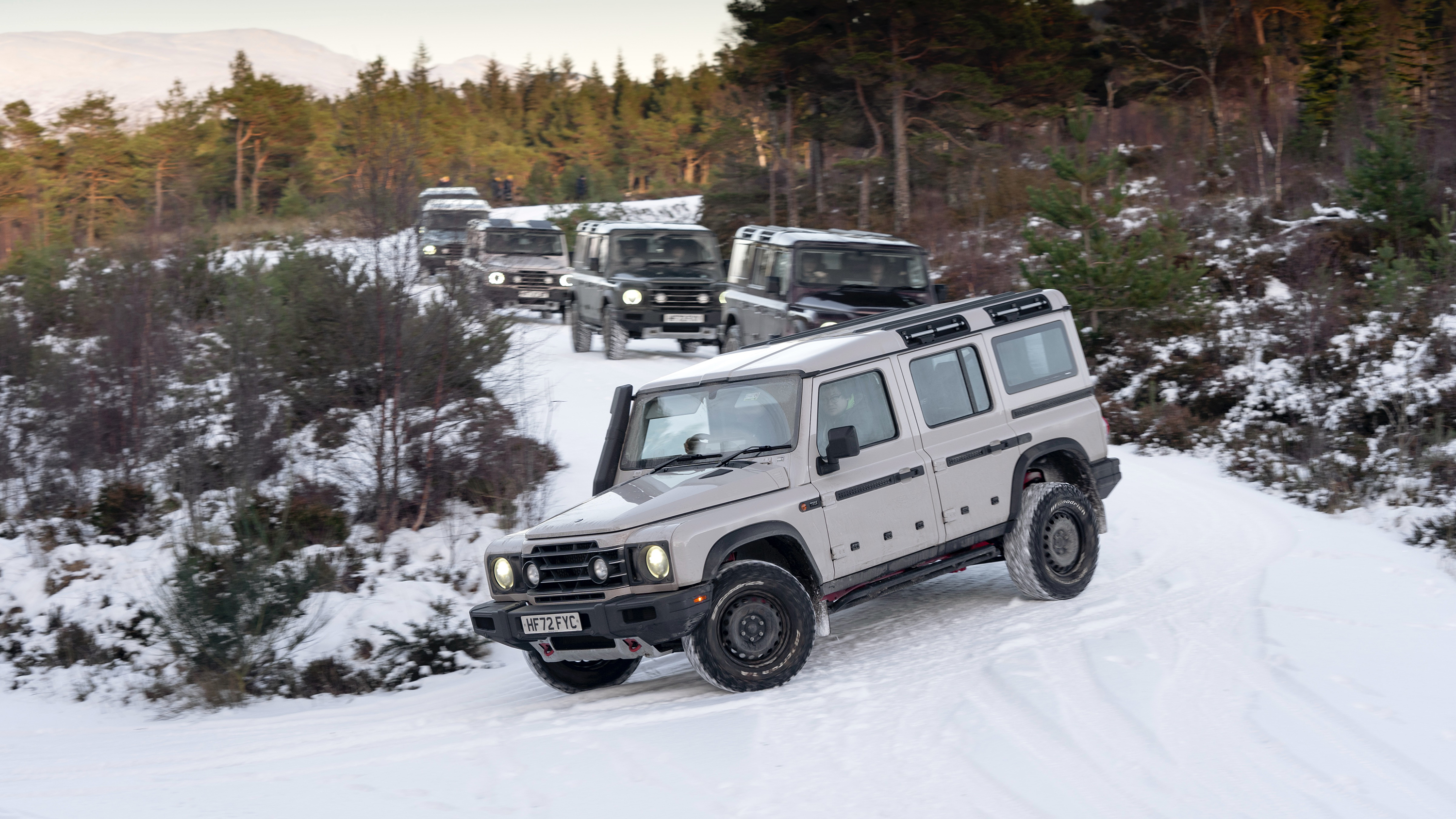
A design that looks familiar...
There’s no escaping how similar the Grenadier looks to the previous-generation Land Rover Defender 110. Despite this, in 2020 the UK High Court ruled against claims made by Jaguar Land Rover that the Grenadier infringes on its trademark by looking too similar to the old Defender.
The slab-sided nature of the Grenadier is born out of practicality, with the flat-sided doors featuring the Exterior Utility Belt for attaching accessories to. The flat-topped front wheel arches are a perfect shelf for holding your green-laning map and cup of tea while you plot your driving route.
Get all the latest news, reviews, deals and buying guides on gorgeous tech, home and active products from the T3 experts
The Utility Belt can be loaded with up to 45 kg of equipment, while a further 35kg can be attached to the rear side door, and hooks on the front and rear doors can hold 5kg and 10kg respectively. Up top, the roof has built-in rails and rubber protection strips, and the optional Rhino Rack can hold 150 kg while driving or 420 kg when parked. An optional aluminium ladder fits to the rear door and can hold 150 kg.
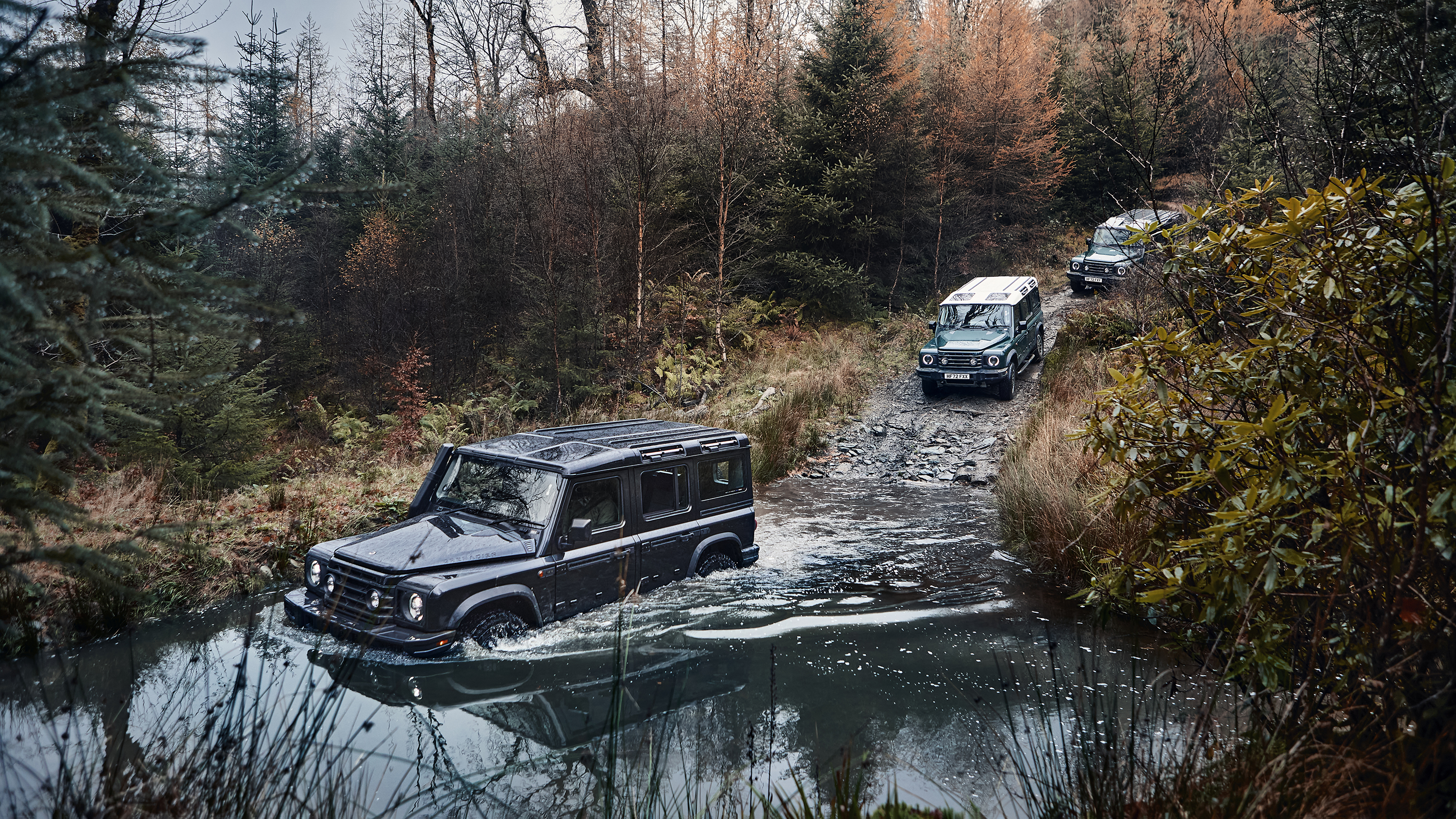
Even the rear-mounted spare wheel acts as storage, as it is mounted with the inner hub facing outwards and covered by a lockable door. Open that, and the wheel cavity is perfect for storing your muddy walking boots.
The roof features a set of pre-wired electrical outputs, controlled by overhead cabin switches and intended for powering light bars and other accessories.
Other notable exterior features include the opening (and fully removable) window panels in the roof above the front seats of the Fieldmaster Edition, and the raised air intake beside the windscreen of the Trialmaster Edition. Both come with five doors, five seats, and a rear tailgate that is split 30:70. At 4,895 mm long, 2,146 mm wide and 2,050 mm tall, the Grenadier is broadly the same size as the current-generation Defender 110.
Prices start at £55,000 for a two-seat utility wagon version (up from the original target of £49,000), rising to £69,000 for the Trialmaster and Fieldmaster models, and £75,000 for the high-specced car I drove. At the time of writing, the Defender 110 starts at £64,035.
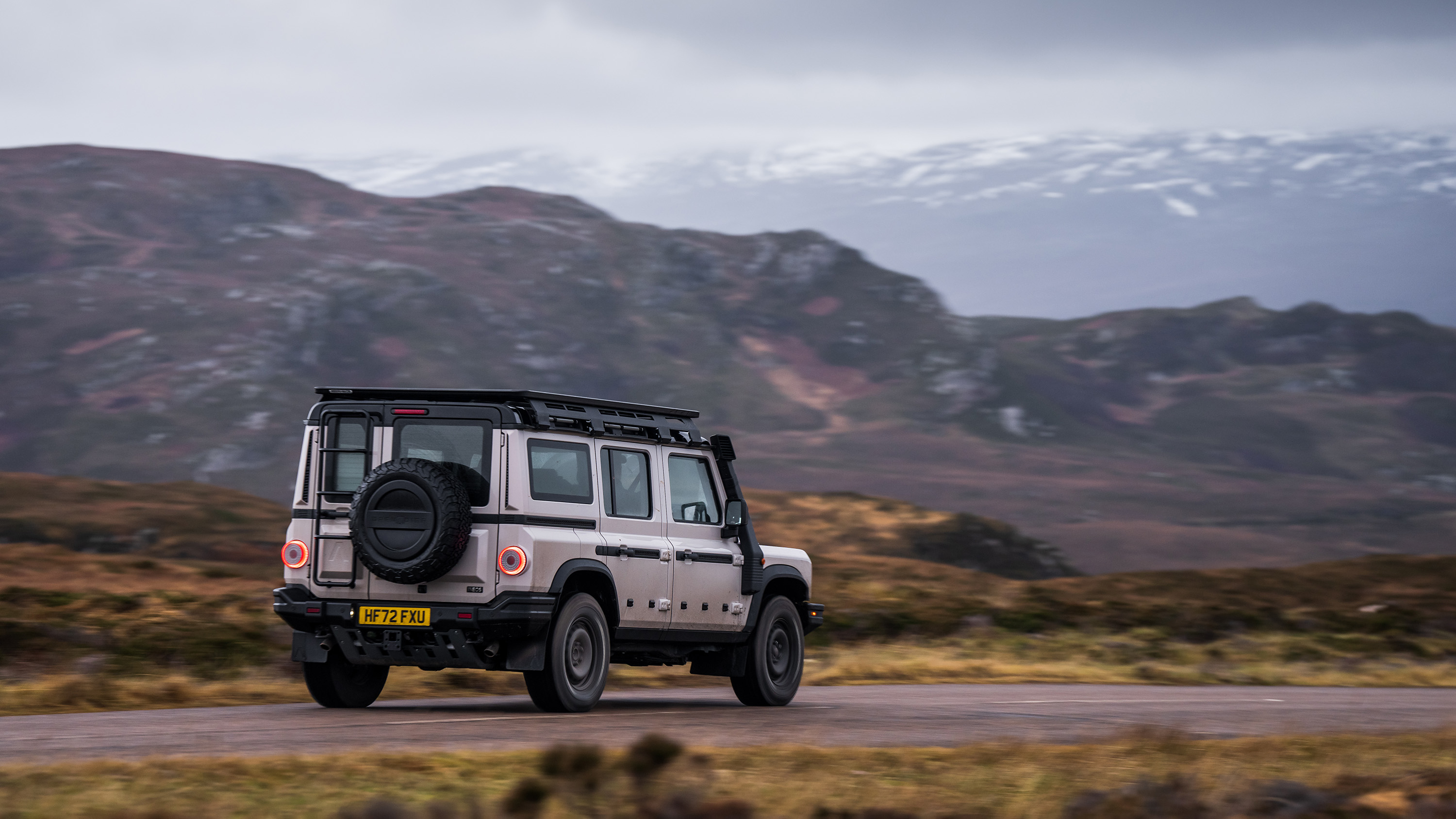
On the inside...
Luxury SUV, the Grenadier is not. Instead the cabin is as slab-sided and function-over-form as the exterior. This means big buttons and knobs that can be controlled while wearing your chunkiest winter gloves and a big, simple display.
Measuring 12.3 inches, that screen runs Ineos’ own infotainment system which includes Apple CarPlay and Android Auto, as well as the company’s own off-road navigation system called Pathfinder, where a route can be created and saved to a USB stick, then shared with and followed by fellow Grenadier owners. Unfortunately, due to user error on behalf of whoever created the route, Ineos says, my car’s Pathfinder system wasn’t working.
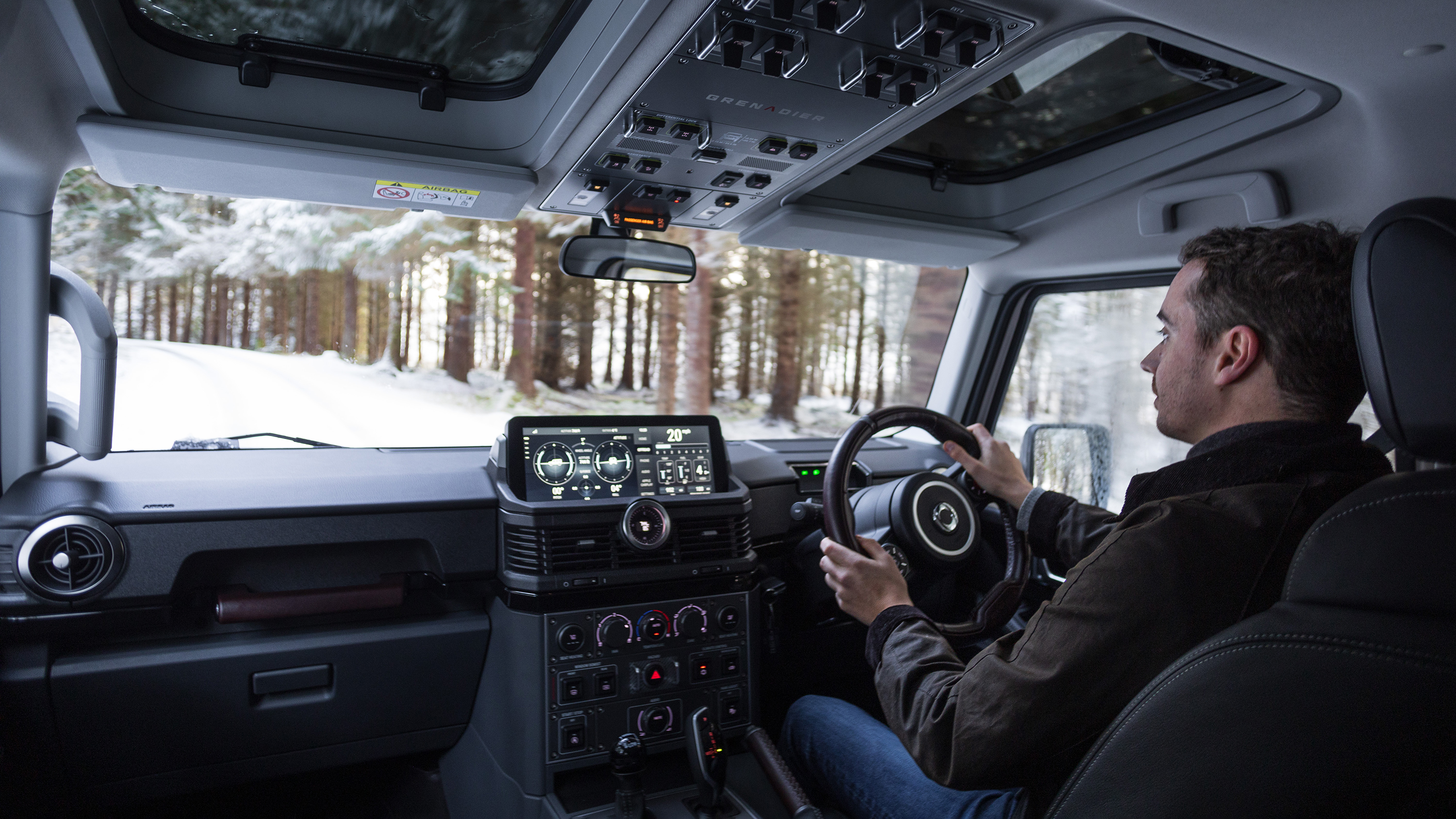
There is no driver display behind the steering wheel, and instead information like speed, revs, fuel level, range and engine temperature are permanently shown on the driver’s side of the central display, like in a Tesla Model 3. The bespoke system includes an Offroad mode that shows pitch and roll angles, wheel angle, tyre temperature and pressure, and, perhaps less usefully, G-force. Other neat details include a physical and digital compass in the centre of the dashboard, along with an altimeter.
Overhead, a bank of aeroplane-style switchgear acts as a fun (although not entirely intuitive) way to control the locking differentials, hill descent mode and external power points. I’m sure muscle memory will eventually take hold, but after two days I still had to search out the right button each time requests for locked differentials came over the walkie-talkie from our expedition leader.
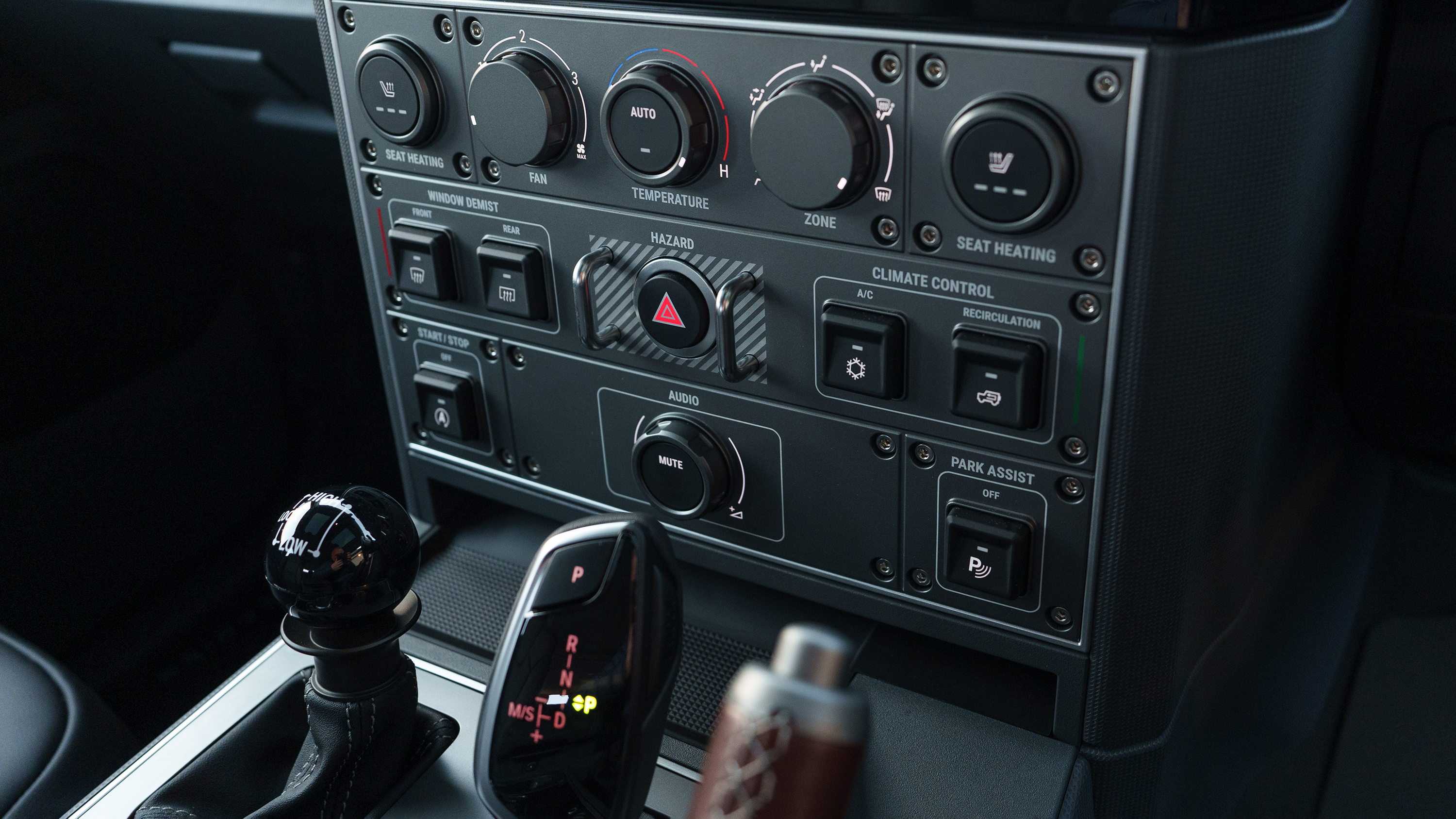
Sitting high up, the driver has a good view out through the near-horizontal windscreen and Defender fans will be pleased to hear there’s more elbow room than in the old Land Rover. Rear seat passengers also get plenty of space, and behind them the boot offers an impressive 1,152 to 1,255 litres of loadspace, depending on specification. That’s about 280 litres more than a current-generation Defender 110.
Thanks to three drain holes and its lack of carpet, the floor of the interior can be hosed out.
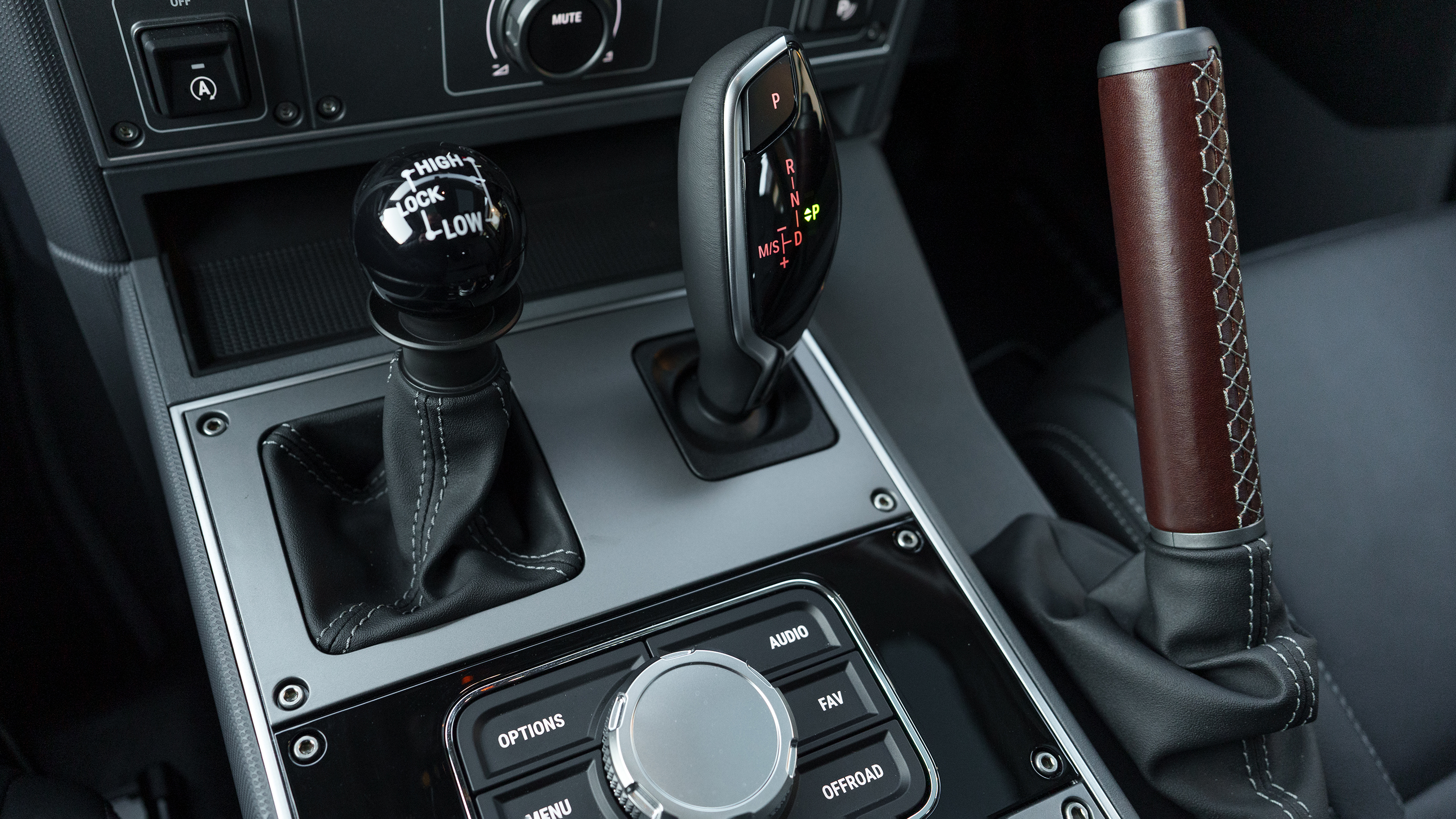
What is the Grenadier like on road?
All models of Grenadier are offered with 3.0-litre, six-cylinder turbo-charged petrol or diesel engines from BMW, paired with an automatic eight-speed gearbox. Instead of the massive, diamond-cut wheels usually found on upmarket off-roaders, the Grenadier comes on 17in steel wheels as standard, with 17in and 18in alloys available as an option. The car comes with all-terrain tyres, developed by Bridgestone specifically for Ineos, as standard.
The Grenadier uses a ladder-frame chassis, five-link front and rear suspension with progressive-rate coil springs and permanent four-wheel-drive.

On fast, flowing roads around Glencoe the car felt pretty agricultural. There are heated seats in the Fieldmaster Edition and even on a sub-zero winter’s day in the Highlands the interior can be made cosy. But the engine’s soundtrack is pronounced, wind noise is higher than in more aerodynamic rivals, and the steering is slow and a little vague. Ineos says this is a result of it using a more robust recirculating ball system instead of the rack-and-pinion setup of most other cars.
The result is a car that requires constant steering correction, which when combined with a noticeable dead spot in the middle and slow response can be disconcerting until you get used to it.

At 2,744 kg with a 90% full fuel tank but no driver, the Grenadier is around 300 kg heavier than a current-generation Defender 110. The BMW engines can cope well enough though; 282 horsepower and 450 Nm of torque from the petrol, or 245 hp and 550 Nm from the diesel, equates to 0-60 mph times of 8.6 and 9.6 seconds respectively.
Claimed fuel economy falls just below 20 miles per gallon for the petrol and 23-27 for the diesel.
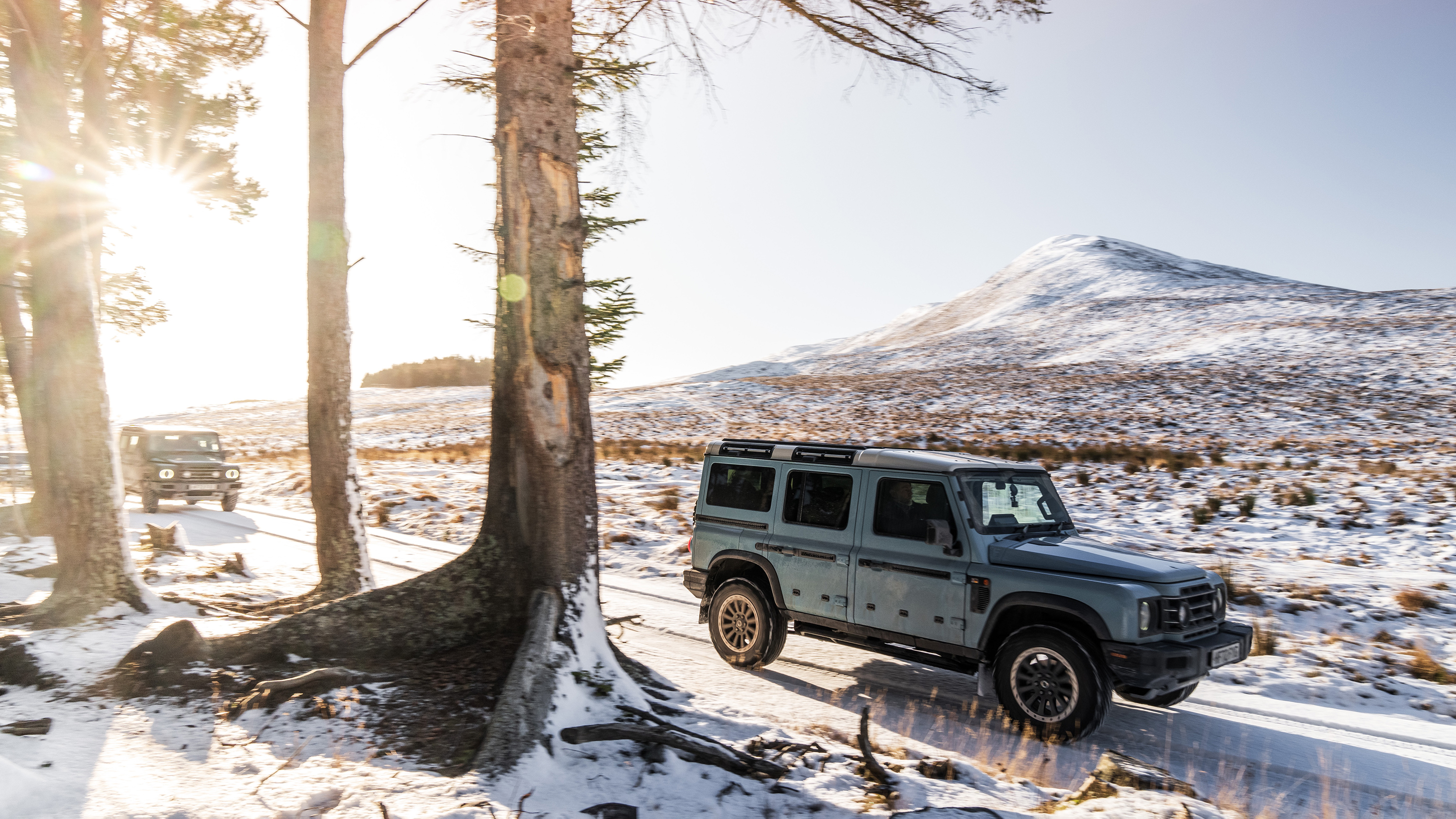
Off-road is where things get really interesting
This is where things get rather technical. Instead of the automatic or touchscreen-controlled systems of most modern SUVs, the Ineos invites its driver to be more physically involved via a manual two-speed transfer case with integrated lockable central differential. Optional front and rear locking differentials are controlled with overhead buttons and used for navigating trickier terrain.
When unlocked, differentials allow the wheels to rotate at different speeds, with power being sent to whichever need it. A locked differential forces its wheels to rotate at the same speed, improving traction when off-roading.

With everything engaged and all four wheels rotating in unison, the Grenadier’s ability to drag itself up steep hills across the private Ardverikie Estate is mighty impressive. There’s real joy to be had in giving the low-range selector a shove, reaching up to lock the diffs like a pilot preparing for takeoff, and pointing the Grenadier across almost any terrain.
We then put the Grenadier’s 800mm wading abilities to the test by driving into Loch Laggan, complete with ice cracking beneath our tyres and water lapping at the doors. Later, the car’s hill-descent system lowered us down the boulder-strewn hillside of an old ski slope in the Trossachs National Park, keeping to a steady 3 mph with both feet off the pedals.
The Grenadier’s off-roading capabilities are right up there with the best of Land Rover, but occasionally its electronics worked themselves into a corner. The locking differentials require a bit of speed and steering angle to unlock after you’ve pressed the button to do so. This isn’t always possible when off-roading, and at one point the car wouldn’t let us use the automated hill descent system because it believed the differentials were still locked, and we were at the edge of a steep drop, so couldn’t drive to unlock them first.

Our car also suffered from a glitch where the indicator and wiper stalks stopped working. This was joined by warnings about reduced brake function and unavailable electronic stability control. An Ineos spokesperson said the cars we drove didn’t have the “final software version,” and the issues I encountered were resolved with a software reflash.
Ineos Grenadier Verdict
Ineos says the Grenadier is “built on purpose” and after driving it I can say it’ll also be bought with purpose. This is not a car you buy to replace your five-year-old Land Rover Discovery, or instead of a new Defender. Those are positively luxurious by comparison.
Instead, the Grenadier delivers on a very clear objective: to act as an up-to-date alternative to the old Defender. It looks very similar, drives in a familiar way and ticks all of the utility boxes — hose-out interior, external power points, three locking diffs — that off-roading fans want. But it does so while removing the creature comforts we’ve all become so used to.
It will also likely serve well as a commercial vehicle, whether that be on a farm, as go-anywhere transportation for park rangers, or a mountain-rescue support vehicle. Think about where you see pickup trucks in the UK today, and the Grenadier will surely nab some of that market, albeit at a hefty premium over the likes of the Ford Ranger.
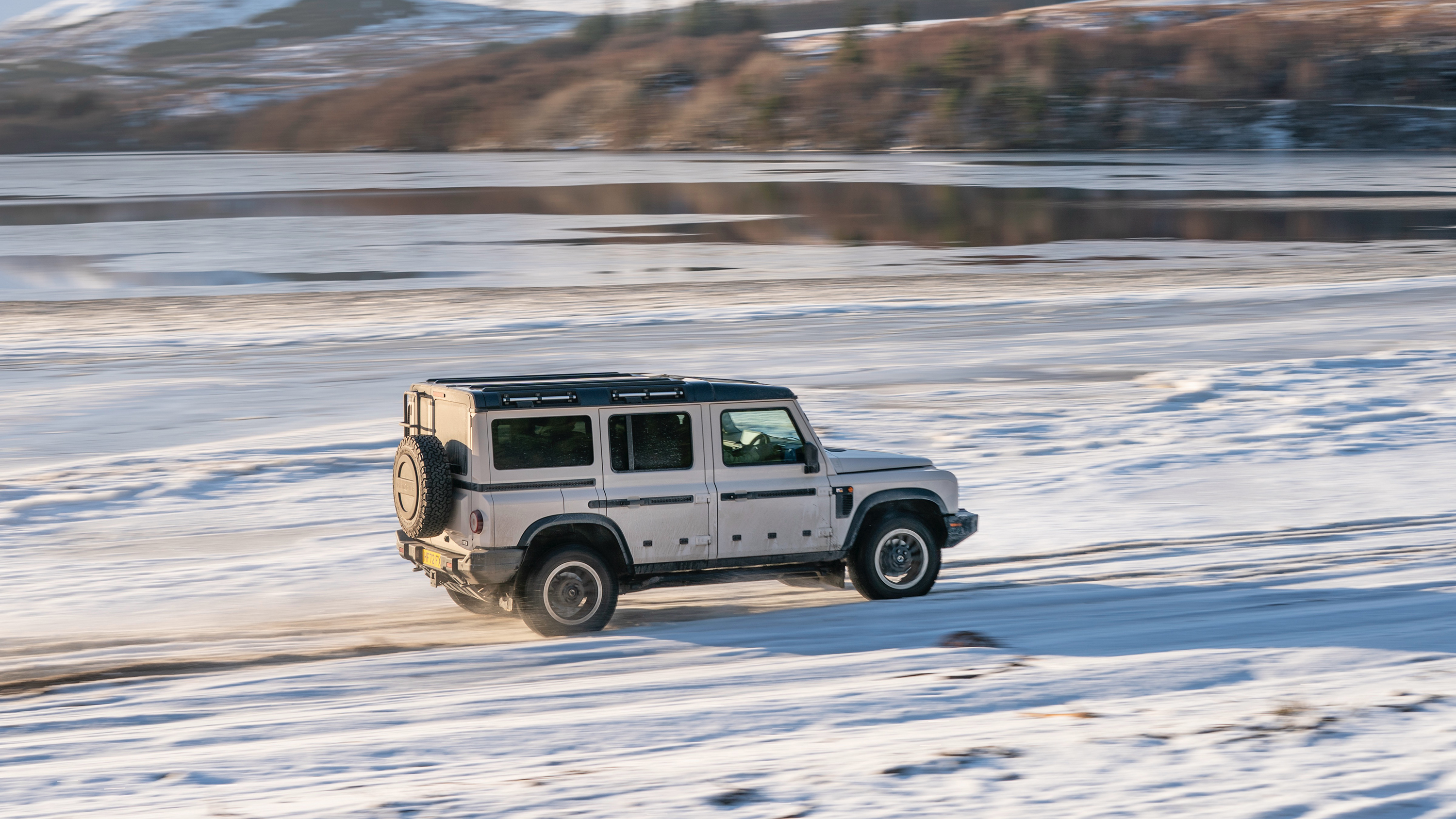
Building cars is incredibly difficult, and especially so when forging a new company from scratch. It has reportedly cost Ratcliffe and Ineos over £1bn to reach this stage. And while getting the Grenadier to the mass-producing startline is impressive, the car isn’t without its failings. There are interior panel gaps that wouldn’t appear in other £55,000 cars; the windscreen wipers streak very easily; our car suffered from a couple of technical gremlins.
Replace the ineffective wipers and the Grenadier is an impressive off-roader that will undoubtedly act as a spiritual successor to the old Defender. It’s now time to see if Jim Ratcliffe is right, and there are enough buyers for his £1bn bet to pay off.
Alistair is a freelance automotive and technology journalist. He has bylines on esteemed sites such as the BBC, Forbes, TechRadar, and of best of all, T3, where he covers topics ranging from classic cars and men's lifestyle, to smart home technology, phones, electric cars, autonomy, Swiss watches, and much more besides. He is an experienced journalist, writing news, features, interviews and product reviews. If that didn't make him busy enough, he is also the co-host of the AutoChat podcast.
